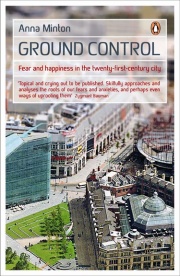
Ground Control
At the request of Esmaa Self, Twitter friend with an obviously cool surname, I thought I’d do a little review of Ground Control by Anna Minton. The book is about the social and psychological impact of British city and housing design, a topic which – to anyone who’s heard me go on about how nice the centre of Leeds is without cars – is clearly a topic close to my heart. It’s also an unabashed polemic against privatisation, the decline of local democracy and British attitudes towards shared spaces and crime.
Divided into three parts, the first – ‘The City’ – deals with the creeping privitisation of large areas of formerly public land in cities, to be policed and controlled by private security firms with their own rules about what behaviour is acceptable within. ‘The Home’ attacks the growth of gated communities and ‘defensible space’, which acts to increase fear of crime as well as strangers in general, robbing cities of the natural protection afforded by strangers in public places. It also lays into the termination of new social housebuilding under Thatcher, and the community-displacing regeneration projects of more recent years. Finally, ‘Civil Society’ challenges the idea that anti-social behaviour is at the root of further crime, arguing that policies such as Blair’s ‘Respect’ agenda are counter-productive in attempting to institutionalise that which can only ever really be provided organically by local communities.
I’m in two minds about this book, and although overall it is well deserving of being read, I’ll start with the negatives in order to end on the high which it deserves. Firstly: it’s perhaps obvious that this is the first full length book from a successful journalist, as there is sometimes an odd pacing which betrays a determination not to go for more than a couple of pages before repeating the central argument of the piece. (She also misuses the word ‘ironically’. Frequently.) More seriously, I’m wary of international comparisons which fall into the oft-repeated technique of reducing the US to wild freemarketism and ‘nice’ continental Europe. Consider the following:
“This is a very European way to enjoy life, window shopping, wandering around, doing nothing, going to the market, taking in the café society of the continental squares and piazzas… rather than spending our way out of recession, we need to look at real alternatives, based on a more European rather than American model, which will moderate the architecture of extreme capitalism…”
Really, though? Europe has one homogeneous model, stretching right across the continent? And before we write off America, shouldn’t we remember that this is the same country which maintains a ginormous system of National Parks? I’m not saying there’s nothing at all in the comparison, but it’s become such a trope that I’d like a little more nuance and case study rather than resorting to ‘Europe’ and ‘America’. Furthermore, it’s a dangerous path to go down, because if you associate ‘markets’ with ‘America’ (i.e. one side of a binary divide) then you lose the ability to suggest workable market mechanisms by which a different culture might be achieved. It is all very well suggesting that there is massive market failure in planning and housing – there is – but that doesn’t mean that the state cannot alter economic incentives in order to change things.
However, this shouldn’t obscure the fact that I do agree with the majority of Ground Control – its central arguments are largely valid, and on an issue which deserves wider public debate. It is important that shopping alone does not come to dominate city centres, and that we retain public, open spaces where citizens are governed by the common rule of law, not private security rules. If we don’t then politics becomes powerless, and so do people. Gated communities in Britain are as vile as they are totally unnecessary. Banning councils from investing ‘Right To Buy’ profits in more social housing was an unqualified policy disaster, fermenting the tensions which we see today being exploited by the likes of the BNP. And, more often than not, it is indeed fear of crime which is a far more debilitating problem than actual crime itself. Segregation by wealth will make both worse.
Minton is very polite, and so never says anything like ‘…and we need thriving British cities, not more suburbia’. So I’m going to say it instead: …and we need thriving British cities, not more suburbia. Suburbia can, of course, inculcate shared public spaces, but does it really have the scale to answer today’s problems? Young people complain that there is nothing to do, the elderly find local services increasingly deemed unsustainable (c.f. the Post Office), whilst everyone needs an alternative to the ghastly reliance on the private car to shuttle back and forwards from place to place without ever really travelling. And aren’t the cities best placed to provide that infrustructure, that diversity, that ‘hustle and bustle’ which Minton euphemistically refers to? A place has got to have more than shopping, but it’s also got to have more than housing plus the odd corner shop. British cities may have their problems, but they’re also worth fighting for, and we abandon them at our peril.








Nice scattering of cool and under-used words there, Dominic Self. There’s been so much hype about this book, but I wasn’t interested *quite* enough to go out and buy it. Do more reviews!
x
"Inculcate" mmmmm.
You should also do the 15 Books thing! C’mon, follow the crowd… xxxxx
We have these in the shop today!
Told you it sounded Bookmarksy.